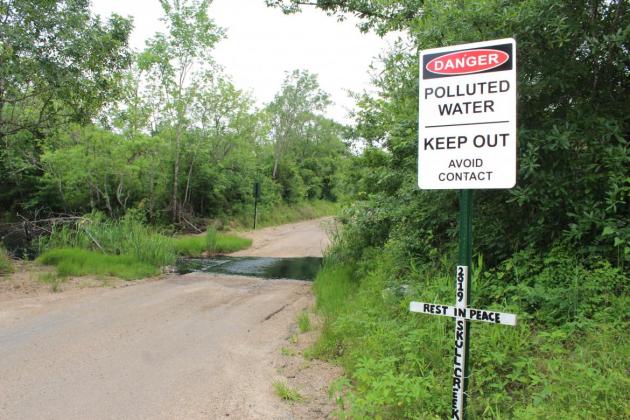SKULL CREEK: Inland agrees to remediation, reporting
AUSTIN--Inland Environmental and Remediation agreed to a 90-day timeline to clean up its Altair Recycling Facility and take immediate steps to ensure contamination from the facility cannot reach Skull Creek, or face a potential trial in district court in January.
The agreement was reached late Tuesday afternoon.
Inland Environmental & Remediation and Attorney General Ken Paxton’s office were expected in District Judge Dustin Howell’s court eary Tuesday morning for a second day of hearings on a temporary restraining order.
By mid-morning, attorneys were huddled in the hallways of the Travis County Civil Courthouse, sharing briefs and discussing settlement terms.
After a couple of delays, the two sides were able to agree to terms for a significant clean-up effort of the Inland Environmental & Remediation site near Altair.
The agreement – an agreed temporary injunction to replace a temporary restraining order – will allow Inland Environmental & Remediation to restart its business activities, as long as those activities fall within the allowable bounds of the Texas Water Code, the Texas Health & Safety Code and the waste and water regulations of the Texas Commission on Environmental Quality. However, the order specifies Inland may not accept any waste at its Altair facility, or process waste in a manner that allows or causes discharges in to waterways. The Citizen previously reported that Inland was alleged to be dumping waste directly in to Skull Creek.
It was unclear Tuesday specifically what business activities Inland could still conduct within the bounds of the order. The Lower Colorado River Authority declined to comment specifically on the agreement. "We will let the order speak for itself," Clara Tuma, Public Information Officer for the Lower Colroado River Authority said in an e-mail to The Citizen just before 9 p.m. Tueday evening.
The 24-page order requires specific remediation steps to start within a week, a month and a three-month time frame.
First, Inland is required to install an impervious seal on all discharge pipes into Skull Creek, a tributary of the Colorado River. Because of trace amounts of contamination to the Colorado River, the Local Colorado River Authority filed a motion to intervene in the ongoing litigation last week which was granted.
The remediation will occur in steps: install the impervious seal on discharge pipes within 10 days; pump, drain and haul away contamination within the so-called Mixing Pit within 30 days; bulldoze, bury or dispose waste from Super Sac Area No. 2 within 7 days, with the intention of completing a more extensive site investigation; and remove and dispose of waste of various designated areas to guarantee no further contact with the Colorado River within 37 days.
Inland Environmental and Remediation also has agreed to place earthen berms and spillway inversions to provide controlled release of water from 50-Acre Lake into Skull Creek during significant rainfall events. The order specifies that controlled releases "shall not inclduie the discharge of any waste from or associated to the site." The order further specifies the berms must be constructed in a way that ensures long-term structural integrity.
Hydraulic isolation of 50-Acre Lake must occur within 30 days.
The temporary injunction also expects Inland Environmental to remove road base material along Skull Creek, launch an investigation to determine the vertical and lateral extent of environmental damage, under the supervision of an outside engineer or geoscientist. The investigation must, the order notes, "include an assessment of the waste, including all Chemicals of Concern," as defined in the Texas Administrative Code. The code defines Chemicals of Concern as, "[a]ny chemical that has the potential to adversely affect ecological or human receptors due to its concentration, distribution, and mode of toxicity."
Inland Environmental must provide weekly progress reports on its work. Both TCEQ and LCRA can inspect the company’s work at any time. If the damage is not remedied, the case will go to trial on January 27, 2020.
BACKGROUND
On Feb 8, of this year, the first incident of contamination--odorus water as black as India ink and dead fish--was reported at the intersection of Texas Highway 71 and Skull Creek near Altair in South Central Colorado County. Shortly thereafter, two additional incidents of similar contamination were reported within two months. This ultimately resulted in the creek perpetually flowing dark black, and emitting a pungent odor.
Between the report of the first incident on Feb. 8 and April 10, county officials sought answers from the Texas Commission on Environmental Quality, Texas Parks & Wildlife Department, and Texas Railroad Commission concerning exactly what chemicals were in the water and what action was being taken to stop the contamination, and receivd few.
In early April, Colorado County Judge Ty Prause, Colorado County District Attorney Jay Johannes, officials from the Colorado County Groundwater Conservation District, Lower Colorado River Authority, and the three agencies investigating the contamination met in the county courtroom of the Colorado County Courthouse in Columbus at the call of Chief W. Nim Kidd, the state's Chief of Emergency Management under the Governor's Office of Emergency Management. Prause requested Kidd call the meeting.
Prause characterized the meeting and the response of the involved agencies as, "beaurecratic chaos," and told The Citizen he received no answers on what was in the water, or if it was dangerous to humans, livestock, or wildlife.
On April 10, The Citizen revealed TCEQ, the state's environmental regulator, determined the water was a hazard to humans early as Feb. 12. The revelation was contained in a letter from the agency to Inland owner David Polston, ordering him to stop polluting and clean up his 300-acre site near Altair. A copy of the memo was obtained by The Citizen.
In its April 10 edition, with an A1 cover headlined, "Skull Creek: Two Months Later, STILL NO ANSWERS," the Citizen produced ten news stories and opinion content relating to the contamination at Skull Creek.
Later that week, the Texas Railroad Commission and Texas Commission and Texas Commission on Environmental Quality released copies of their earliest water testing results to Colorado County Judge Ty Prause and the newspaper.
On April 28, the Texas Attorney General's Office, on behalf of the state and TCEQ, filed a lawsuit in state district court in Travis County alleging inland had violated various provisions of the Texas Water Code, and seeking temporary and permanent injunctions against the company, requiring it to cease most of its operations, except operations permitted under two TCEQ permits. A judge granted the application for a TRO and set the case for a May 2 hearing to determine whether or not to grant a permanent injunction.
In the interim, for reasons still unclear, the case came up earlier in the week. Inland and Polston filed a motion for a continuance, which was opposed by the state.
In its filing opposing the continuance, the attorney general's office alleged conditions at Skull Creek and Inland had worsened, that the company was bulldozing gelatinous solid waste in to the ground, and that black substances were oozing out of the ground at the Inland site. The 300-acre Inland site includes about a mile of frontage along Skull Creek, according to a report from Terracon, a private company hired by the Texas Railroad Commission to remediate a portion of Inland's site surrounding an injection well the commission sealed for failure to report injection volumes in compliance with permit requirements in 2016.
Boundary Ventures, an Inland-affiliated company owned by Polston owned the injection well on the company's Altair site, later filed bankruptcy, and forfeited a $5.7 million performance bond and paid a $500,000 fine to the commission, according to information obtained from the commission's press office.
A continuance was ultimately denied, and and more restrictive temporary restraining order was issued by a judge.
Read all of the Citizen's Skull Creek coverage here.

